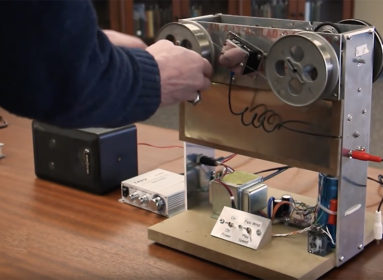
All That’s New and Exciting in Connecticut’s Jewish Day Schools
As the new school year approaches, the Ledger checks in with Connecticut’s Jewish day schools to find out about the new and exciting programs that will greet students in the 2017-18 academic year.
NOTE: Schools that are included here as listings only did not report back to the Ledger by press time. Visit their websites for more information.
EASTERN CONNECTICUT
Solomon Schechter Academy
(Pre-K – grade 6)
29-B Dayton Road, Waterford
(860) 443-5589 / ssa-newlondon.org
Barbara Wolfe, Head of School
GREATER HARTFORD & CENTRAL CONNECTICUT
Bais Yaakov of Waterbury (Girls’)
High School
66 Buckingham St., Waterbury
(203) 805-8401 / bywaterbury.org
Ita Selengut, Principal
Bess & Paul Sigel Hebrew Academy
(Early Childhood 2’s – grade 8; plus before- and after-school care)
53 Gabb Road, Bloomfield
(860) 243-8333 / sigelacademy.org
Rabbi Zev Silver, Principal
Hebrew High School of New England
300 Bloomfield Ave., West Hartford
(860) 231-0317 / hhne.org
Rabbi Jeremy Bruce, Head of School
Solomon Schechter Day School of Greater Hartford
(Early Childhood 2’s – grade 8)
26 Buena Vista Road, West Hartford
(860) 561-0700 / ssds-hartford.org
Andrea Kasper, Head of School
Yeshiva Ateres Shmuel of Waterbury Mesivta
(Boys’ High School)
47 Buckingham St., Waterbury
(203) 756-1800 / yasw.org
Rabbi Daniel Kalish, Principal
Yeshiva K’tana Elementary
(Nursery – 8)
32 Hillside Ave., Waterbury
(203) 528-4147 / ykwaterbury.org
Rabbi Yehuda Brecher and Penina Noy, Principals
GREATER NEW HAVEN
Bais Chana Academy High School for Girls
261 Derby Ave., Orange
(203) 795-5261 / schacademy.org/bais-chana-academy
Bluma Hecht, Principal
Ezra Academy
(K – 8)
75 Rimmon Road, Woodbridge
(203) 389-5500 / ezraacademy.net
Dr. Melanie Waynik, Head of School
Southern Connecticut Hebrew Academy
(Preschool – grade 8)
261 Derby Ave., Orange
(203) 795-5261 / schacademy.org
Rabbi Sheya Hecht, Headmaster
Yeshiva Beis Dovid Shlomo Mesivta (Boys’ High School)
292 Norton St., New Haven
(203) 789-4571 / ybdsnewhaven.org
Rabbi Yosef Lustig, Principal
SOUTHWEST CONNECTICUT
Bi-Cultural Day School
(Early Childhood – grade 8)
2186 High Ridge Road, Stamford
Jacqueline Herman, Head of School
Rabbi Harold Tzvi Bernstein, Dean
Carmel Academy
(Transitional kindergarten – grade 8)
(203) 863-9663 / carmelacademy.com
Nora Anderson, Head of School
Jewish High School of Connecticut
1937 West Main St., Stamford, CT 06902
(203) 357-0850 / jhsct.org
Rabbi Elisha Paul, Head of School
Dr. Paul Castle, Principal
Bess & Paul Sigel Hebrew Academy
The Bess & Paul Sigel Hebrew Academy is currently in year two of a dynamic process of upgrading and enhancing its educational programming.

As her bat mitzvah project, a Hebrew Academy student raised $2,500 to revamp the school library and enhance reading opportunities. Seventh-graders then took owner ship of the project by going on a book-buying spress at Barnes and Noble and presenting their purchases to the school.
The Academy’s growing preschool has adopted the Easy Breezy preschool Curriculum, which focuses on all aspects of a young child’s development. The school’s team of warm and nurturing teachers engender in their charges a love of learning and a love of Judaism.
The school’s math program has been transformed through the implementation of Singapore Math, a highly regarded program that has been hailed by the New York Times, and emphasizes mastery of math, having children think about math and applying math to real-life situations. Academy teachers are continually hone their skills in this technique though weekly coaching and training led by a math expert.
During the spring, the school welcomed a baby chick that was born in the Academy’s revamped science lab. The school’s science curriculum utilizing components of Glencoe Science as well as Science Fusion has engaged and challenged our students. Students initiated an after-school science club led by their teacher. Like the Academy’s math teacher, science teachers receive ongoing training from a leading science educator who, together with the teachers, has put together a dynamic K – 8th-grade science curriculum.

Prior to the Hebrew Academy Book Fair, the school’s principal, Rabbi Zev Silver, got younger students in the spirit by dressing as “The Man in the Yellow Hat” and reading to them Curious George stories.
Our Reading/Language Arts curriculum has been transformed through the implementation in the younger grades of Super Kids Core Literacy Curriculum as well as Sadlier Vocabulary Workshop and Write Source Writing Curriculum.
In the older grades, students are actively engaged in reading and writing and all of the school’s initiatives align with the objectives of STEAM – Science, Technology, Engineering, Arts and Math. In our Judaic studies classes, students have benefited from new Israel Engagement programs that not only teach about Israel but foster a love for and a connection to the Jewish state. Through the Academy’s new Hebrew Language programs, students will gain a strong proficiency in conversational Hebrew.
This year, the Academy middle school welcomes Rabbi Shlomo Teitz, a dynamic educator from New York who will engage students in thought-provoking, enriching Torah learning that will inspire the children to become life-long learners and ethical and moral Jewish leaders.
Bi-Cultural Day School
So many new and exciting programs and initiatives to talk about happening this year at Bi-Cultural Day School. Here are two:

Bi-Cultural students celebrated Yom Ha’atzmaut in Israel, while on the school’s month-long Israel trip for 8th-graders.
Junior Makerspace – Since it was unveiled in February 2016, the Makerspace Lab at Bi-Cultural Day School has become a breeding ground for student creativity; a place where budding young inventors in grades 1 through 8 can bring their imaginative, innovative ideas to life. Now, a year and half down the road, the success of Makerspace in stimulating learning and fostering creativity among older students prompted Bi-Cultural administrators and faculty to think out-of-the-box… and build an activity-filled Makerspace for preschoolers – the first of its kind in Connecticut. Each piece included in the Junior Makerspace is purposeful, functional and can have a multi-faceted approach to further support the curriculum. The goal is for preschoolers to explore all of the ‘what ifs’ that occur when they are surrounded by the tools that inspire them to create, and to find solutions to problems by trying something different. Bi-Cultural plans to give young families an opportunity to see the space “in action” at a grand opening scheduled for later this fall.

Bi-Cultural students tested out some of the technology highlighted at a fair celebrating the first anniversary of Makerspace.
Positive Discipline – Over the summer, BCDS early childhood teachers were trained in the techniques of “Positive Discipline,” a comprehensive approach to promoting good behavior in the classroom that is designed to bolster students’ self-esteem and help them thrive and grow into confident, successful, responsible adults. Using Positive Discipline methods, teachers don’t abdicate authority – but they do encourage children to discuss their mistakes, problem-solve, determine the consequences of their actions, and come up with ideas for resolving their issues. They don’t ignore problems – but they do reinforce and encourage good behavior, helping children learn how to handle situations more appropriately.
Recently, Bi-Cultural was invited to join a Positive Discipline cohort of the JDS Collaborative, a forward-thinking initiative whose mission it is to innovate Jewish Day school education by capitalizing on schools’ passions and priorities. Bi-Cultural is invited by the Collaborative to work on the development of the Positive Development philosophy with Beit Rabban, a Manhattan day school. BCDS is launching the program in preschool with the intention of working its way up through the grades.
Carmel Academy

Carmel Academy Shorashim transitional kindergarten students prepare to bake as part of a chesed project in which they sold their baked goods to raise money for a local animal shelter.
Celebrating its 20th year, Carmel Academy curriculum is designed to nurture students who are passionate learners, inquisitive problem-solvers, confident leaders, and dedicated to bettering the world. Carmel Academy’s science, technology, engineering, arts and mathematics programs have been recognized nationally. Everyday learning is supplemented by a wide array of enrichment, athletics and extracurricular activities.
As part of Carmel’s commitment to providing a meaningful Jewish day school experience for all children, Carmel offers a program for children with learning disabilities. In its tenth year, Carmel Academy’s PALS program is the only inclusive special education program in the tri-state area.
Ezra Academy
This year, Ezra Academy piloted a new program called “Teva Tuesdays.” Each week, students spent an afternoon outdoors, learning and becoming aware and appreciastive of the vital role the earth plays in our existence. Students were encouraged to gain a deep, profound respect for the environment, to become Shomer Adamah (guardians of the land) through study of Jewish texts that promote these ideas, and to engage in the mitzvoth (commandments) and middot (values) that connect to this concept. Students were involved in project-based learning through the integration of Jewish holidays (honey bee collapse; harvest; sh’chita), science, environmentalism, and sustainability. This very successful endeavor will be expanding into several other grades this year.
Ezra’s new Makerspace is quickly becoming the most popular space in the school. Makerspaces encourage students to imagine, be productive and creative and learn through hands-on interactions. Students get creative using technology and traditional tools. ‘Makers’ learn to identify challenges, solve problems, and deeply understand difficult concepts, working across disciplines to achieve goals. They learn to take risks, develop a growth mindset and value creativity, curiosity, persistence and teamwork. Ezra combines physics and robotics, put coding into practice by using a 3-D printer, construct roller coasters, Rube Goldberg machines and build bridges. The possibilities are endless.
Hebrew High School of New England (HHNE)
The Hebrew High School of New England (HHNE) will launch a number of exciting projects in the coming academic year.

Two Hebrew High School of New England juniors engage in collaborative study in the school library using chromebooks.
In the 21st century, as young people prepare for college and life after high school, a new set of skills is required to navigate an increasingly complex, fast-paced world. Today, students must not only excel in the traditional disciplines of reading, writing and arithmetic, they must become competent collaborators, excellent communicators, critical thinkers, creative problem-solvers and global citizens.
In order to foster these skills, HHNE in partnership with the Sigel Hebrew Academy of Greater Hartford and Solomon Schechter Day School of Greater Hartford, will pioneer a regional STEAM (science, technology, engineering, arts and math) initiative. Led by project coordinator and AP Biology teacher Zach Towne, high and middle school students will work together to develop their skills to solve real-world science and technology problems pairing older and younger students together in collaborative teams. As students assess potential solutions for these problems, they will consider how Jewish tradition can provide important moral and ethical insights into these complex modern issues. Older students will gain valuable opportunities to mentor and guide middle-school students, and middle-school students will gain an understanding into the advanced and stimulating science, technology and math program offered by HHNE.
Last year, HHNE introduced a new UConn accredited U.S. history course that enables students to obtain college credits for UConn and other colleges across the country. As a result of the program’s success, HHNE will expand these courses further by offering two new UConn courses: Introduction to Human Rights, and Comparative Politics and Government. These high-level courses will supplement the eight Advanced Placement (AP) courses currently offered by the school.
In addition, following great demand, HHNE will offer a neuro-psychology course that will introduce students to cutting-edge research and science of the brain and its impact on human behavior and society.
The Judaic program continues to be enhanced by new curricula in Talmud and Chumash that establishes innovative ways to teach our ancient tradition. This past year, students had the opportunity to engage with a group of seniors at the Mandell JCC, to teach, debate, and discuss their Jewish learning. This program will be expanded to give more opportunities for our students to study and interact with more local seniors.
Finally, this year HHNE will launch a monthly Mishmar program, which is a community-learning initiative making use of HHNE’s extensive Jewish library and Judaic resources to allow people of all ages to learn and celebrate Jewish texts and traditions. This evening program will be enhanced by traditional foods, music and singing led by our newly appointed director of student Activities, Rabbi Aharon Skoglund.
Jewish High School of Connecticut (JHSC)
In the 2016-17 academic year, the Jewish High School of Connecticut became certified as a University of Connecticut Early College Experience program site. JHSC instructors simultaneously teach high school classes and UConn courses which give students college credit on a UConn transcript while they are still in high school. These credits are considerably less expensive than they cost as part of UConn tuition and allow students to essentially begin their college classwork while still completing high school.
In the 2017-18 academic year, JHSC will welcome the largest ninth grade class since the school opened. More than 25 students will join their upper classmen for the fall semester of 2017, bringing total school enrollment to 50 students.
JHSC’s unique approach to education is designed to inspire and cater to the individual skills, passions and aspirations of each student. The school, located in a science and technology building, creates a “google-like environment.” “It is this environment of collaboration and innovation that inspires and drives our school curriculum and spirit,” said Rabbi Paul. “We are forging a new kind of high school, and students are responding enthusiastically.”
Solomon Schechter Academy
This year, Solomon Schechter Academy (SSA) is moving to a new home at Temple Emanu-El in Waterford.
Given that children are natural scientists from the youngest ages, SSA will focus on this year’s school-wide theme: “Ocean Literacy.” Through special activities and research, students will study the ocean not only in science class, but across all subject areas – learning about ocean life, water pollution, desalination, ancient and modern water systems, navigation and ship-building, and professions related to the ocean.
Another highlight of the year will be a month-long STEM project entitled “Building the Future.” Students’ understanding of science, technology, engineering and math concepts will deepen as each class engages in developmentally appropriate, hands-on activities that go into designing and building various structures. This school-wide activity will culminate in the design and construction of a classroom-sized model of a city. In addition to teachers, SSA will draw upon the expertise of several school parents, including a mathematician and an architect, who are eager to participate in this project.

At Solomon Schechter Academy, Hebrew teacher, Liora Zeevi works with a student on a craft activity for the celebration of Israel Independence Day.
Another change at the school is the extension of the hours of the pre-kindergarten program. In the first few weeks of school, pre-school activities will center on children developing new friendships, communication skills, and creative play. Movement/dance, art, music, and story time will be key elements of the program. Students will delve into themes such as moon exploration, growing plants from seeds, and building a terrarium. Children will also learn about Jewish holidays through songs and craft projects.
SSA continues offer a robust curriculum in language arts, math, science, social studies, Hebrew language, and Judaics – including Shabbat challah-baking and services. They also take part in weekly art, music, and physical education classes and there are numerous enrichment opportunities throughout the year.
Solomon Schechter Day School of Greater Hartford (SSDS)
Schechter offers an academic program grounded in the belief that every individual has the power to impact the community and the world. The school prides itself on offering a dynamic and progressive education, focusing on: problem-solving; critical thinking and text analysis; artistic expression; and a personalized approach. The school strives to graduate students who are bold, creative, compassionate and capable of navigating an ever-changing world.
Building on the progressive approach of its Reggio Emilia-inspired early childhood program, the SSDS lower school utilizes a multi-age classroom structure – ensuring that each child fulfills her/his ultimate potential through individualized instruction. Lower school classrooms expose students to Hebrew language throughout the day, a literacy-rich environment, where they explore the world of science, math, art and music. Torah comes alive as students analyze the ancient texts and discover for themselves their own powerful connections to Torah, both as individuals and as members of the Jewish people. They develop skills of independence, collaboration, time management, resilience and perseverance.
The school’s deep appreciation for students and their interests reaches through middle school, where eighth-graders have the opportunity to pursue a year-long independent study project. Schechter’s Rogow Middle School students apply text study, critical thinking and problem-solving skills across all subjects, including science, math, engineering, art, Judaic Studies, Hebrew and Spanish languages and the humanities.
Southern Connecticut Hebrew Academy
This year, Southern Connecticut Hebrew Academy announces the creation of a new leadership team. Rabbi Baruch Kaplan, Rabbi Schneur Wilhelm and Kay Pacileo will share the responsibilities of the principal of the school, with each focusing on his or her areas of expertise. Each member’s unique perspective and approach, will offer a new level of synergy to the SCHA experience for both the students and faculty.
“We are confident that this development will lead to a successful year and SCHA will rise to new academic heights and achievement,” says Rabbi Sheia Hecht.








 Southern New England Jewish Ledger
Southern New England Jewish Ledger














